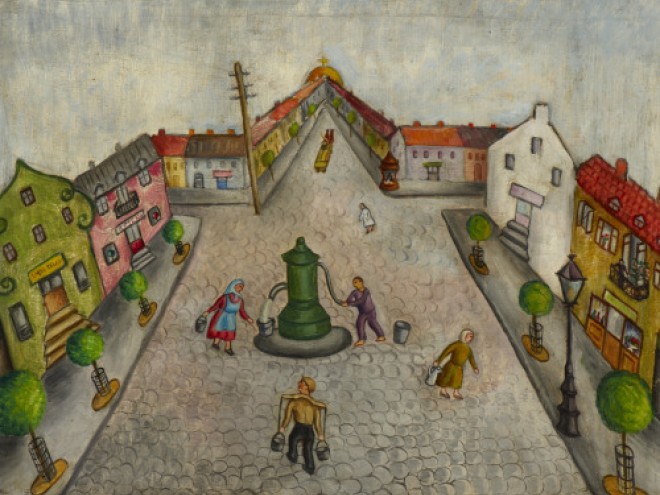Bob Goldfarb recently spoke to Joshua Fattal, who co-authored, alongside Shane Bauer and Sarah Shourd, the recently published book A Sliver of Light: Three Americans Imprisoned in Iran, in which they document their experiences.
 Bob Goldfarb: How long had you known Shane before you were captured?
Bob Goldfarb: How long had you known Shane before you were captured?
Joshua Fattal: We thought we were best friends. We knew each other since we were twenty and had lived together. However, after living in a prison cell with him for a few weeks, I remember reflecting that I actually didn’t know him as well as I thought. We had never seen each other weep nor did we talk emotionally like we did in those weeks.
BG: Your captors figured out from your name that you’re Jewish. And although you aren’t religious, you wrote that you “feel Jewish” What were you feeling?
JF: It’s an identity thing, which means it was about my relationship with myself. I always identified with being Jewish. I guess my parents instilled it so deep in me that I couldn’t just shake it off even though so much of the tribalistic stuff – Jews who think they are smarter than everyone else – always turned me off.
BG: For a period of time you observed the Sabbath in prison as best you could. Did it have a meaning for you there that it doesn’t have when you’re safe at home?
JF: Prison made life miserable, but it also made life meaningful. Six days of the week are for work. The Sabbath is for rest, for creativity, for re-creation. I couldn’t do any of those things. I couldn’t even work during the six days, but by celebrating Shabbat, I honored the fullness of life. It was my feeble attempt to keep life sacred under the most execrable circumstances.
BG: Sarah’s emotional suffering seemed especially extreme. After an early hunger strike she is curled up in her cell and in tears, and when a young female guard enters she says “I love you” to this stranger. And there are episodes of screaming, banging her head against the bars of the cell. She feels jealousy and rage. At one point she considered converting to Islam. What made her so vulnerable?
JF: That’s her personality. She’s dramatic like that. I was in hell too, but I’m just less dramatic. As Bob Dylan says, “It’s all right ma, it’s life and life only!”
BG: Sarah also repeatedly tells herself things like “I am made of steel” and “I am determined.” Was that true too? Or was she compensating for feeling the opposite?
JF: Jews try to be psychologists. Freud was Jewish. That’s why my book is great for Jews. You get to analyze all three of us.
BG: Is it ever possible to trust a prison guard? What about the empathetic one, Ehsan?
JF: No, it’s never possible, but you have to. Trusting is essential to being human. If you forget the possibility of trust, you forget part of your humanity. I trusted Ehsan’s intentions. Actually, I trusted a lot of their hearts. But I didn’t trust that they’d email my family like I begged them to. Empathy and action are different things. Self-interest is a powerful impulse. Every once in a while, the empathy I invoked translated into a small action, and it made my day. It kept me human.
BG: Everybody is probably guilty of something. Can captors and interrogators gain power over a prisoner by finding that inner guilt? Did yours?
JF: The interrogators didn’t do it. I did it to myself by trying to make sense of my environment. I searched through my life to find things I was worthy of being punished for and tortured myself. Yes, tortured. That is a big part of why solitary confinement is considered torture.
BG: Shane remarked at one point, “These ideas of acceptance, this Buddhist seduction, it’s all bullshit.” He felt his life was slipping away because he accepted his situation. How do you feel about the Buddhist idea of acceptance, and negating desire, after your ordeal?
JF: This was one of the problems of being stuck with only books to explain ideas. Shane failed to understand the nuance behind the profound Buddhist concept of acceptance. He simply read the word acceptance and thought it meant submission. However, it is a profound idea that enabled me to let go of constant anger and frustration while simultaneously striving to change our conditions.
BG: All three of you relate incidents where you stood up to the guards and emerged in a stronger position. Would that have happened if you weren’t prisoners with special status? Is it a good strategy outside confinement?
JF: Definitely a good idea! If you don’t have privileged status like I did, then you take higher risks, and are required to be a hero. But that is what heroes do – they take risks. Prisoners in Guantanamo with less rights than I had continue to stand up for themselves by going on hunger strike. If they didn’t do that they’d be even more forgotten and tortured than they currently are. Resistance is a key component to any social change.
 BG: In the final pages Sarah and Shane each give impassioned speeches about politics; you tell a human story about the effect of the Israeli occupation on a Palestinian family. That seems to reveal a way that you’re different from your friends.
BG: In the final pages Sarah and Shane each give impassioned speeches about politics; you tell a human story about the effect of the Israeli occupation on a Palestinian family. That seems to reveal a way that you’re different from your friends.
JF: We are very different. For me the simple fight is for humanity. Orwell calls it “common decency.” Stories kept me human in prison. I remembered my first love. I remembered stories my father told me about growing up as an Iraqi refugee in Israel. In prison, I dreamt of stories: of tearing down prison walls and running, of talking sense to politicians in Iran and America, and of dancing in a sunny park with friends in springtime. Stories were all I had in there. And oddly, the stories we tell ourselves about our lives, our past, and our future are what shape the world.
Bob Goldfarb is director of marketing and audience development at The Forward and the president of the Center for Jewish Culture and Creativity. He lives in New York.
Related Content
- Visiting Scribe Posts by Joshua Fattal
- Interviews with Authors
- A Lethal Obsession by Robert Wistrich



